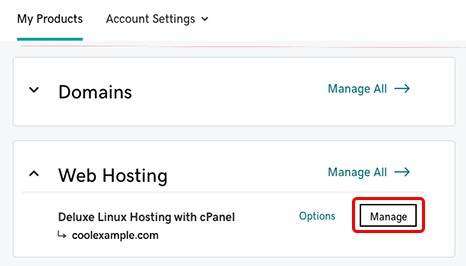Generate a CSR (Certificate Signing Request) for my cPanel hosting
Want to skip these manual steps? Our SSL solution automatically secures your site, redirects to HTTPS, and fixes security issues for you. Protect your site now!
You can generate a Certificate Signing Request (CSR) in the cPanel account after your domain is pointing to the hosting product.
- Go to your GoDaddy product page.
- Under Web Hosting, next to the Linux Hosting account you want to use, click Manage.

- In the account Dashboard, select cPanel Admin.
- In the cPanel Home page, in the Security section, select SSL/TLS.
- Under Certificate Signing Requests (CSR), select Generate, view, or delete SSL certificate signing requests.
- Complete the fields in the Generate a New Certificate Signing Request (CSR) section.
- At the bottom of the form, select Generate.
| Field | Description |
|---|---|
| Key | Detailed description. |
| Domains | The fully-qualified domain name, or URL, you want to secure. Note: If you are requesting a Wildcard certificate, add an asterisk (*) to the left of the common name where you want the wildcard, for example *.coolexample.com. |
| City | Name of the city where your organization is registered/located. Do not abbreviate. |
| State | Name of the state where your organization is located. Do not abbreviate. |
| Country | The two-letter International Organization for Standardization (ISO) format country code for where your organization is legally registered. |
| Company | The legally-registered name for your business. If you are enrolling as an individual, enter the certificate requestor's name. |
On the new page, your CSR appears in the Encoded Certificate Signing Request section. You'll need to make a copy of the CSR to request an SSL certificate.
Next step
After you create a CSR, you will need to request a Standard, Deluxe or Extended Validation certificate.
More info
Note: As a courtesy, we provide information about how to use certain third-party products, but we do not endorse or directly support third-party products and we are not responsible for the functions or reliability of such products. Third-party marks and logos are registered trademarks of their respective owners. All rights reserved.